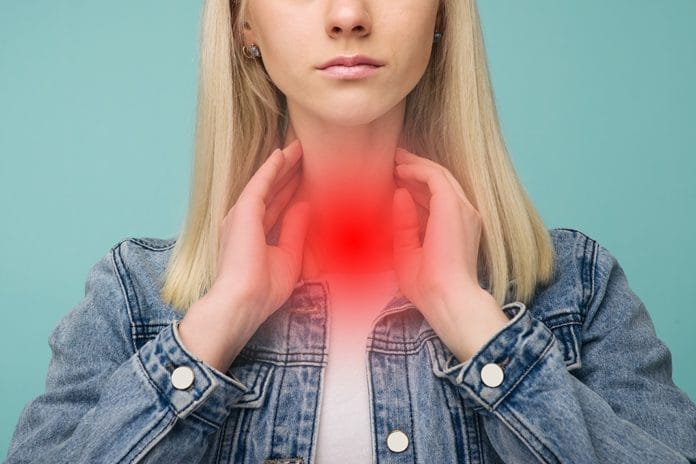An elderly female patient recently presented with hypothyroidism. Her health history documented that she was taking Synthroid. While verbally reviewing and updating her health history, she stated that she also took an OTC thyroid vitamin but did not know its name. She also disclosed that she is seeing an herbalist who is having her rub two essential oils (lemongrass and mint) on her thyroid.
These additional disclosures were not on her health history, just the Synthroid medication. I asked if her medical doctor was aware of her additional OTC “thyroid” vitamin and essential oils supplements. She replied that she did not see why he would need to know. My concern was/is: Could this patient be putting herself at risk for possibly throwing her already compromised thyroid even further off balance?
The patient’s extraoral head and neck exam did not reveal any significant findings. During neck palpations, she inquired about where her thyroid was located since she was unsure where to rub the lemongrass and mint essential oils. Education was given via manual manipulation and onscreen Google images, helping her understand her thyroid location. I found it interesting that neither her medical doctor nor herbalist properly educated her on the exact location of her thyroid.
Why is the Thyroid Important?
The thyroid is a butterfly-shaped gland in the front of the neck, situated below the Adam’s apple, and above the collar bone. It regulates metabolism (how fast your heart beats and how fast you burn calories). It is a hormone-producing endocrine gland necessary for healthy body regulation. Thyroid diseases such as hypothyroidism (Hashimoto’s disease) or hyperthyroidism (Graves’ disease) deregulate the metabolic functions in the body.
Hypothyroidism
Underactive thyroid disease is when the thyroid gland does not make enough thyroid hormone. The thyroid gland releases hormones that travel through the bloodstream affecting the heart, brain, muscles, skin, and other body parts. Without enough thyroxin in our bloodstream, these systems may fail.
One cause of hypothyroidism is Hashimoto’s disease. Hashimoto’s disease is an autoimmune disorder where the immune system turns against the body’s own tissues. Hashimoto’s disease causes hypothyroidism as the immune system attacks the thyroid.1 People with Hashimoto’s disease usually present with a goiter (enlarged thyroid), which reveals as a thickened or enlarged neck.
Some causes of Hashimoto’s disease include genes, hormones (more common in women than men especially after the first year after having a baby), excessive iodine (too much salt intake), and excessive radiation exposure.1 Extraoral examination, palpation, of the neck will reveal an enlarged thyroid (goiter).
Common oral manifestations of hypothyroidism are:2
- Enlarged salivary glands
- Periodontal issues – delayed bone resorption
- Macroglossia (enlarged tongue)
- Glossitis (depapillation of tongue, smooth tongue, sometimes soreness occurs)
- Dysgeusia (distortion of the sense of taste)
- Delayed dental eruption
- Enamel hypoplasia
- Anterior open bite
- Micrognathia (small jaw)
- Thick lips
- Mouth breathing (which leads to gingival inflammation, periodontal issues, halitosis, and xerostomia)
Symptoms of hypothyroidism may include:3
- Fatigue
- Fever
- Dry skin
- Goiter (enlarged thyroid gland)
- Weight gain
- High cholesterol
- Sensitivity to cold
- Constipation
- Muscle weakness
- Joint stiffness and swelling
- Irregular menstrual cycles
- Dry hair/hair loss
- Delayed puberty and growth
* These symptoms may be vague and often mimic other medical conditions.
Hypothyroidism and Essential Oils
Upon researching the essential oils that my patient mentioned, I discovered they were used to control the symptoms of hypothyroidism. So they should not adversely affect her prescribed Synthroid medication.
Lemongrass essential oil may help with the digestive issues, headaches, and inflammation caused by an underactive thyroid (hypothyroidism). A drop of lemongrass may be added to tea, or a few drops added to your bath or applied directly to the skin via a carrier oil (such as olive oil).4 Hence, it is used to alleviate symptoms of hypothyroidism; not as a treatment to the actual deficiency.
Peppermint essential oil may help with headaches, fatigue, brain fog, digestive issues, and may calm depression associated with hypothyroidism. Simply add a drop to your herbal tea, add a few drops to your bath, or apply directly to the skin with a carrier oil.4 Again, the peppermint oil is alleviating symptoms, not acting as a treatment.
Other essential oils used to alleviate hypothyroidism symptoms are frankincense, rosemary, grapefruit, myrrh, and Endoflex.4 These essential oils seem harmless and should not interfere with the effects of the prescription regulation thyroid medication. So, two thumbs up if the essential oils make you feel better.
Hypothyroidism Supplements
It is not recommended to take OTC supplements for hypothyroidism, however, as the hormones are not monitored and could alter your hormones’ precisely calibrated levels. Health complications could result in excessive thyroid levels, especially when added to a prescribed Synthroid or Levoxyl regimen.
Some thyroid supplements actually contain raw thyroid from bovine, which could put you at risk for mad cow disease. The addition of iodine in these supplements is also a concern since it may slow the function of the thyroid or stop its function altogether. Too much of a good thing is not always a good thing. Patients should consult with physicians about unregulated supplements.
Hyperthyroidism
This is the condition that occurs due to excessive production of the thyroid hormone (thyroxine) in the thyroid gland. A significantly speedy metabolism may provoke many unpleasant conditions as it breaks the body down to causing fatigue and exhaustion.
One possible cause of hyperthyroidism is Graves’ Disease. Some people with Graves’ disease may develop bulging eyes, which affects vision and the muscles and tissues around the eyes. Other symptoms of Graves’ disease include burning eyes, grittiness and pressure in the eyes, redness, and inflammation around the eyes, double vision, or even loss of vision.4
Oral Manifestations of Hyperthyroidism:2
- Increased susceptibility to caries
- Increased susceptibility to periodontal disease
- Enlarged thyroid tissue (goiter), swollen neck
- Burning mouth syndrome
- Accelerated dental eruption (possible due to rapid metabolism)
- Osteoporosis of maxilla and mandible
- Development of connective tissue diseases such as Sjogren’s syndrome or systemic lupus erythematosus (autoimmune diseases)
Common Symptoms of Hyperthyroidism:5
- Nervousness, anxiety, irritability
- Mood swings
- Exhaustion, tiredness, feeling weak
- Sensitivity to heat
- Goiter (enlarged thyroid)
- Sudden weight loss
- Frequent bowel movements
- Tremors
- Sleep issues due to increased irritability, heart rate, nervousness, etc.
- Fine and brittle hair, thinning skin
- Menstrual changes
* Note that many of these symptoms mimic other conditions and can be very confusing. Bloodwork needs to be done to test the thyroid’s ability to regulate thyroxin.
Hyperthyroidism and Essential Oils
Wintergreen essential oil may induce relaxation. Sandalwood essential oil may calm anxiety, help patients to relieve stress, and induce relaxation and focus, inner vision, and happy thoughts. Frankincense essential oil may have sedative effects. Lemongrass essential oil calms nerves and nervous disorders, helps with insomnia, and strengthens the immune system. Again, these essential oils are used to alleviate symptoms.6
Hyperthyroidism and Supplements
It is never advised to take additional thyroid supplements without consulting with your physician. The addition of unregulated thyroid supplements in addition to an already prescribed medication could throw a patient’s body off balance.
Thyroid Testing
The T4 and TSH tests are routinely performed together. The T4 test (thyroxine test) is positive for hyperthyroidism if a high level of T4 in indicated. The TSH has a normal range between 0.4 and 4.0 milli-international units of hormones per liter of blood (mlU/L). You are at risk for hypothyroidism if you show signs of hypothyroidism and have a TSH reading above 2.0 mlU/L.7
If T4 and TDH tests indicate hyperthyroidism, a T3 test will be ordered to rule out kidney problems or the body not uptaking enough protein. T3 (T3RU) is a blood test that measures the binding capacity of thyroxin-binding globulin (TBG). Abnormally high levels of TBG may indicate high levels of estrogen (caused by pregnancy, obesity, or hormone replacement therapy).7
Both Hashimoto’s disease and Grave’s disease may cause goiters, making it very important to refer for medical evaluation and bloodwork for proper diagnosis and treatment. Iodine deficiency is the most common cause of a goiter. Statics show that women over the age of forty are at highest risk for developing thyroid issues. Make sure to have thyroid bloodwork done at your annual checkups, and make the same recommendation to your patients.
Role of Hygienists
Patients with hypothyroidism may have increased bleeding and difficulty with hemostasis, delayed wound healing which puts them at risk for infection, and sensitivity to CNS depressants and barbiturates means sedatives should be used sparingly.2
Patients with hyperthyroidism may also present with high blood pressure and heart rate, may also be at risk for hemorrhage, are susceptible to infection, and should limit the use of ASAs and NSAIDs. An interesting fact is that fluoride was used as a drug to treat hyperthyroidism as it reduces thyroid activity.2
Common sense alerts us to treat the oral indications of hypothyroidism and hyperthyroidism as needed. Having a blanket handy for someone who suffers from hypothyroidism is comforting, presenting xerostomia options for both hypo and hyperthyroidism is critical, and preventing and/or managing periodontal, and caries issues should be a standard of care.
It is the hygienist’s role to thoroughly review and update health histories, asking appropriate questions pertaining to the patient’s oral and overall health. We gain knowledge when we gather information.
Part of the resources for gathering information arise from the intraoral and extraoral head and neck examination. Extraoral palpation of the thyroid gland gives us important data, especially if there is thickness in the thyroid region. In addition, a visual perusal of the patient’s head and neck anatomy provides us with more information. Scan for a thickness of the neck, thinning hair, dry skin, and even protruding eyes.
A simple thyroid screening and referral (if necessary) to their medical doctor could change a life.
Before you leave, check out the Today’s RDH self-study CE courses. All courses are peer-reviewed and non-sponsored to focus solely on pure education. Click here now.
Listen to the Today’s RDH Dental Hygiene Podcast Below:
References
- Hashimoto’s Thyroiditis. WebMD. Retrieved from www.webmd.com/women/hashimotos-thyroiditis-symptoms-causes-treatments
- Chandna, S., Bathla, M. (2011). Oral manifestations of thyroid disorders and its management. Indian J Endocrinol Metab. 2011; 15(Suppl 2):S113–S116. doi:10.4103/2230-8210.83343. Retrieved from https://www.ncbi.nlm.nih.gov/pmc/articles/PMC3169868/
- Hypothyroidism. WebMD. Retrieved from https://www.webmd.com/women/hypothyroidism-underactive-thyroid-symptoms-causes-treatments#1
- Essential Oils for Thyroid. New Health Advisor. Retrieved from https://www.newhealthadvisor.com/Essential-Oils-for-Thyroid.html
- What is Hyperthyroidism? What Are the Symptoms? WebMD. Retrieved from https://www.webmd.com/a-to-z-guides/overactive-thyroid-hyperthyroidism
- Essential Oils for Thyroid Support. Bio Source Naturals. Retrieved from https://www.biosourcenaturals.com/essential-oils-thyroid/
- Thyroid Function Test. Healthline. Retrieved from https://www.healthline.com/health/thyroid-function-tests#takeaway











